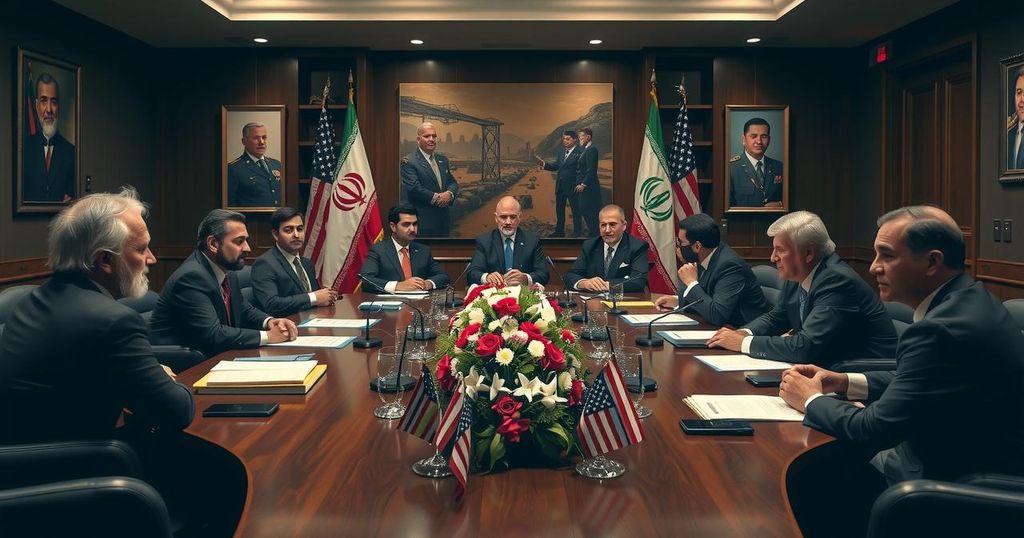Iran and Syria Meet in Astana: Strengthening Ties Against Regional Tensions
Ali Asghar Khaji, Iran’s senior foreign minister advisor, met with a Syrian delegation in Astana, Kazakhstan, as part of a six-year diplomatic initiative involving Iran, Russia, and Turkey. The meeting focused on Syria’s political developments, regional tensions, and the mutual benefits of strengthening Syria-Iran ties. Moreover, recent outreach efforts between Iran and Saudi Arabia signify improved relations amid ongoing discussions to address Israeli actions in the region.
In Astana, Kazakhstan, Ali Asghar Khaji, the senior adviser to the Iranian foreign minister, convened with a Syrian delegation as part of ongoing discussions involving Iran, Russia, and Turkey regarding the future of Syria. This meeting, the 22nd in the series initiated six years ago, aims to promote reconciliation between Turkey and the Syrian regime, which has recently consolidated its power in western Syria. Iran’s participation reflects a serious commitment to the process, even as the degree of interest from Russia and Turkey remains uncertain. During the meeting, the Iranian delegation emphasized addressing the challenges posed by “the crimes of the Zionist regime” while striving to prevent regional tensions from escalating. The discussions also included recent military aggressions and geopolitical developments in the region. Furthermore, the envoy highlighted the importance of bolstering strategic ties between Syria and Iran, reinforcing their collaborative stance against perceived threats. Iran appears to be leveraging this platform alongside recent high-level meetings in Saudi Arabia to consolidate support against Israel, aiming to restore stability in the region and support Palestinian and Lebanese populations. The Astana talks are crucial in this regard, having been a key diplomatic initiative since 2017 aimed at resolving the ongoing Syrian civil war. Additionally, Iran’s Vice-President Mohammad Reza Aref has extended an invitation to Saudi Crown Prince Mohammed bin Salman to visit Tehran, signifying a thaw in relations between the two nations, which have been improving over the last two years. Aref remarked, “There is no doubt that the benefits of this deepening of relations will not only include Iran and Saudi Arabia, but certainly… this will lead to the development of regional cooperation and solidarity among Islamic nations.” The recent dialogues in Astana coincided with reports from Lebanon indicating Iraq’s intention to host an Arab summit to discuss regional issues, underlining the continued significance of Iranian influence in harnessing solidarity against Israel among Arab states. Iran’s engagement in Iraq remains a strategic move allowing it to extend its reach and support militias targeting Israeli interests.
The Astana format emerged in 2017, facilitated primarily by Iran, Turkey, and Russia, to address the complexities of the Syrian civil war that erupted in 2011. This trilateral arrangement has attempted to establish peace negotiations, while simultaneously allowing the involved nations to negotiate their geopolitical interests within Syria. Iran has long positioned itself as a key ally of the Syrian government, directly supporting the regime militarily and politically, while also seeking to unify regional players against common threats, notably Israel. Through diplomatic endeavors in Astana, Iran aims to solidify its influence in the region and promote its agenda of resisting external aggressions.
The meeting in Astana underscores Iran’s commitment to fostering alliances with Syria and pursuing a united front against perceived threats, particularly from Israel. The ongoing discussions in Astana serve as a platform to reinforce strategic ties amidst evolving regional dynamics, as evidenced by Iran’s outreach to Saudi Arabia and its intention to collaborate with Iraq and other Arab states. The evolving geopolitical situation necessitates continuous dialogue and cooperation among the involved nations, particularly given the long-standing challenges in Syria and the tradition of conflict in the region.
Original Source: www.jpost.com




Post Comment